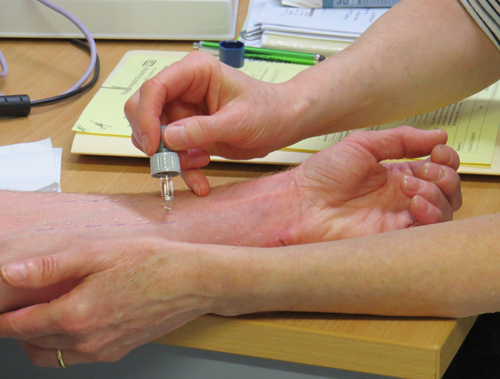 This is a universal allergy test and often used to find out what is causing an allergy. It gives results on the same day of your visit and is a very helpful first step. However, we can only do skin prick testing if you have not taken any antihistamine tablets or liquid for at least three days.
This is a universal allergy test and often used to find out what is causing an allergy. It gives results on the same day of your visit and is a very helpful first step. However, we can only do skin prick testing if you have not taken any antihistamine tablets or liquid for at least three days.
Skin prick testing involves placing a drop of liquid onto the skin of the forearm and pricking through it with a sharp type of pin called a lancet. Most people coming to the allergy clinic will be tested to find out whether they are sensitive to common airborne allergens, such as:
- grass
- tree and weed pollen
- cat and dog hair
- moulds
- house dust mites
- certain foods, such as nuts and apples
This is a safe way of testing for allergies to common substances, for example grass pollen and house dust mites. It is not painful, but can cause an itchy rash that lasts up to 30 minutes.
Sometimes severe allergic reactions can occur so it is important to know how to avoid contact with latex if you have this allergy.
Anaphylaxis is a serious allergic reaction that can be life-threatening or fatal.
People with hay fever (rhinitis) have inflamed lining in their nose, which causes it to be blocked, running and itchy, as well as causing sneezing.
Urticaria is a condition which involves the development of itchy wheals (hives) on the skin.
Around 5–10% of people who have a problem with a drug are suffering from a drug allergy, possibly one prescribed by their GP or as part of an investigation in hospital.
Between 1-10% of adults and children in the UK have a food allergy.
Occupational lung disease covers a broad group of conditions caused by the inhalation of dusts, chemicals, or proteins.
Asthma is a common lung condition that causes occasional breathing difficulties. There is no cure for asthma but in most sufferers, available treatments keep their symptoms under control.
The Trust offers a wide range of allergy services for adults of all ages. This includes specialist services for patients with difficult to manage allergies.
Contact us
Phone: 020 7351 8892
Find us
Allergy Team, Fulham Wing/South Block, Royal Brompton Hospital, Fulham Road
